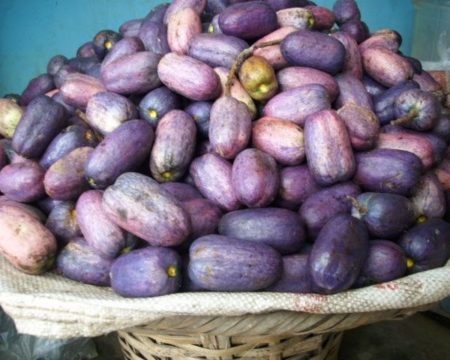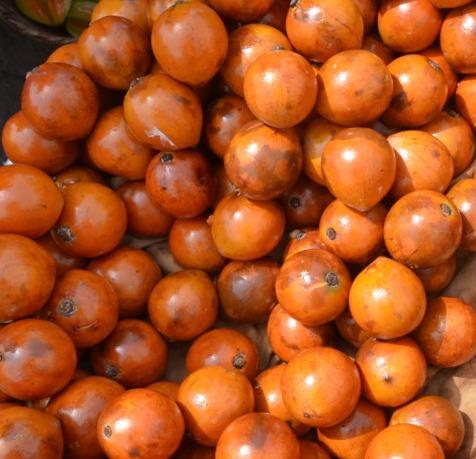African pear, native pear or bush pear is a native fruit of West Africa, mainly found in south-east Nigeria, where it is popularly called ube. It is botanically known as Dascroides edulis (Fam. Burseraceae). It is pink in colour when unripe, but turns dark-purple when riped. Some people refer to it as butterfruit, due to the buttery taste in its pulpy pericarp when steamed to a certain temperature.
Constituents
Studies have revealed that ube is loaded with essential ingredients for warding off diseases. These include carbohydrates, sugars, fibre and vitamins (especially thiamine, riboflavin, niacin, panthotenate folate, vitamin C and vitamin B6).
The fruit has been reported to contain several minerals such as calcium, iron, magnesium, potassium, phosphorus, and zinc. A wide range of chemical constituents like terpenes, flavonoids, tannins, alkaloids and saponins have been isolated from the plant. Both the pulp and seeds of the African pear contain reasonable quantity of oil, containing linoleic acid, palmitic acid, oleic acid and stearic acid.

Pharmacology and health benefits
The African pear tree is used by traditionalists to prepare herbal medicines for treating several health disorders, such as fever, wound, dysentery, sores and skin diseases. Studies reveal that the extracts of this fruit have antioxidant, diuretic, antimicrobial, anti-inflammatory, anti-hypertensive, anti-sickle cell and anti-spasmodic properties which can be attributed to the phytochemicals present in it.
Studies have revealed that regular consumption of African pears help protect women against postmenopausal breast cancer, might lower the risk of age-related macular degeneration (the main cause of vision loss in older adults), help lower blood pressure (the small clustered seeds enclosed by mesocarp in the fruit are responsible for this) and also reduce the chances of a stroke.
The high content of pectin in pears make them useful in lowering cholesterol and in the treatment of parasitic skin diseases such as such as ringworm and craw-craw. Pears have been found to be good for colon health (reducing constipation by aiding normal bowel movement).
Preparations
The African pear can be eaten raw, fried, roasted or tenderized in hot water before eating. It can be eaten alone but is ideally enjoyed together with cooked, roasted or boiled corn – a perfect combination in terms of their seasonality. Pear juice, being rich in fructose and glucose, serves as a very quick source of energy.
Pear is described as a hypoallergenic fruit because it is less likely to produce allergic reactions than other fruits.
Economic value
African pear tree is typically planted for its shade and its fruit, though the bark of the tree is aromatic. The pulp contains 48 per cent oil. A plantation can produce seven to eight tons of oil per hectare. The oil is suitable for cosmetics and food; the flower nectar is also valuable for honey.
The resin found in African pears can serve as fuel (can be burnt for lighting); the tree can be cut and used as firewood, while the leaves can be used as manure for cultivating farm produce. The twigs serve as chewing sticks. The tree is usually huge, and thus can be used to improve soil quality as well as for the prevention of erosion.
The tree wood is suitable for making axe-handles, mortars and for general carpentry. The resin is used for mending earthenware. The fruits are traded locally and internationally, conferring enormous economic value on the plant. The average price of the fruit in markets in Nigeria where home consumption accounts for about 70%, ranges from USD 300-700/ton of fruits.
As a traditional food plant in Nigeria, ube has potential to not only boost health, but also to improve nutrition, boost food security, and foster rural development and sustainable land care.
By Ngozika Okoye, FPCPharm, MSc MPH (Nigeria Natural Medicine Development Agency)











best online international pharmacies india: https://genericwdp.com/ generic pills for sale
tadalafil gel: http://tadalafilonline20.com/ tadalafil pills
Insightful. I am interested in joining your agency